|
|
|
Sort Order |
|
|
|
Items / Page
|
|
|
|
|
|
|
| Srl | Item |
| 1 |
ID:
105932
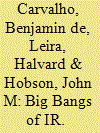

|
|
|
|
|
| Publication |
2011.
|
| Summary/Abstract |
International relations as we know them emerged through the peace of Westphalia, and the discipline of International Relations emerged in 1919 and developed through a First Great Debate between idealists and realists. These are the established myths of 1648 and 1919. In this article we demonstrate how historical and historiographical scholarship has demolished these myths, but that the myths regardless are pervasive in the current textbooks that are used in teaching future IR scholars. Disciplinary dialogue seems to have failed completely. Based on a detailed reading of the myths and their perpetuation, we discuss the consequences of the discipline's reliance on mythical origins, why there has been so little incorporation of revisionist insight and what possibilities there are for enhancing the dialogue.
|
|
|
|
|
|
|
|
|
|
|
|
|
|
|
|
| 2 |
ID:
163198
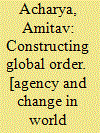

|
|
|
|
|
| Publication |
Cambridge, Cambridge University Press, 2018.
|
| Description |
xiii, 215p.: figures, tablespbk
|
| Standard Number |
9781316621783
|
|
|
|
|
|
|
|
|
|
|
|
Copies: C:1/I:0,R:0,Q:0
Circulation
| Accession# | Call# | Current Location | Status | Policy | Location |
| 059582 | 341.2/ACH 059582 | Main | On Shelf | General | |
|
|
|
|
| 3 |
ID:
075325
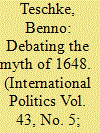

|
|
|
|
|
| Publication |
2006.
|
| Summary/Abstract |
This rejoinder restates and develops the central theses of 'The Myth of 1648: Class, Geopolitics and the Making of Modern International Relations' in relation to a set of objections raised from the perspective of IR Historical Sociology by Hendrik Spruyt, of Political and Social Theory by Roland Axtmann and of Political Geography by John Agnew. Most centrally, it re-affirms the charge of a defective historicisation and theorisation of 'Westphalia' in the discipline of International Relations, while suggesting that a Marxist perspective that emphasises the spatio-temporally differentiated and geopolitically mediated development of Europe is capable of providing a new long-term interpretive framework for the complex co-development of capitalism, state building and the interstate system. It thereby pleads for a paradigm-shift in IR Theory and IR Historical Sociology.
|
|
|
|
|
|
|
|
|
|
|
|
|
|
|
|
| 4 |
ID:
141223
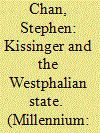

|
|
|
|
|
| Summary/Abstract |
Despite seeming to express an openness towards the world, Henry Kissinger’s new book, World Order: Reflections on the Character of Nations and the Course of History, is in fact deeply conservative in terms of his adherence to the Westphalian state as the desirable actor in International Relations, and almost as a normative condition of the world’s architecture. Kissinger sketches his views of different regions of the world, but these views are derived from his past experience more than a nuanced and forward-looking view of a rapidly changing world.
|
|
|
|
|
|
|
|
|
|
|
|
|
|
|
|
| 5 |
ID:
192647
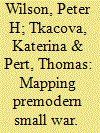

|
|
|
|
|
| Summary/Abstract |
The example of the Thirty Years War (1618–48) demonstrates that small war was already integral to the conduct of premodern hostilities. Commanders employed these methods with a purpose and generally tried to limit the accompanying violence to preserve discipline and effectiveness, as well as their claims to be waging a just war. We explain why conventional histories have neglected the presence of small war in premodernity, and show how its importance, methods, and wider impact can be reconstructed through innovative digital mapping techniques, which have the potential to be applied to conflicts in other times and places.
|
|
|
|
|
|
|
|
|
|
|
|
|
|
|
|
| 6 |
ID:
118610
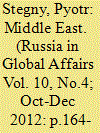

|
|
|
|
|
| Publication |
2012.
|
| Summary/Abstract |
The Arab Spring, which has been raging in the Middle East for two years, has swept away seemingly irremovable regimes in Egypt, Libya, Tunisia, and Yemen. In Syria, where the Ba'athist leadership has preserved its bond with the armed forces and law enforcement agencies, the civil war is escalating with unclear prospects for President Bashar al-Assad's regime. In terms of the democratic transformation of the region, during the past two years of the Arab Spring more has been done than in the entire history of the independent existence of Middle Eastern countries. However, the process is not yet complete: democratic change has affected the core of the Arab world and stopped in its periphery - at the borders of the traditionalist monarchies of the Persian Gulf, which are attempting to bribe their way out of long overdue transformations. Iraq, Lebanon, and Algeria are immune to "twitter revolutions," as they had earlier undergone (albeit with varying degree of success) the cycle of modernization, including foreign interventions and civil wars. The monarchies of Morocco and Jordan are adapting, with sufficient flexibility, to the imperatives of the day, and are continuing to make concessions to the opposition. Yet on the whole, the impression of the region is not that of a decisive pivot towards democracy, nor that of integration into global modernization processes.
|
|
|
|
|
|
|
|
|
|
|
|
|
|
|
|
| 7 |
ID:
157610
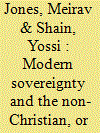

|
|
|
|
|
| Summary/Abstract |
This article participates in efforts by IR theorists to clarify aspects of modern sovereignty – an idea currently in rupture and being rethought – by returning to its founding ‘Westphalian moment’. While recent work has reconnected modern sovereignty to religion, considering Westphalia as a religious settlement and Christian concerns persisting in the groundwork of IR, our work looks beyond Christian concerns and asks how Westphalian sovereignty addressed non-Christians. We trace a yet-untapped discussion of the Jews – presented as a paradigmatic religious ‘other’ – among architects of Westphalian sovereignty from Bodin through Grotius, Hobbes, Harrington, and Spinoza. We demonstrate that foundational theorists of modern sovereignty considered religious diversity a political problem. Some cited essential sameness, minimising difference between Jews and Christians. Others considered the possibility of Jewish sovereignty long before this idea is usually considered to have entered modern consciousness. While the discussion of Jewish sovereignty among architects of modern sovereignty may seem to justify a Jewish state in a world of Westphalian states, it also emphasises Westphalia’s territorialising of religious difference. This aspect of the Westphalian framework is surely inadequate today, when territorialising religious difference is neither normative nor likely possible.
|
|
|
|
|
|
|
|
|
|
|
|
|
|
|
|
| 8 |
ID:
110769
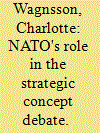

|
|
|
|
|
| Publication |
2011.
|
| Summary/Abstract |
This article argues that traditional Westphalian powers are increasingly pressured to move beyond Westphalia towards institutionalization of security cooperation and a broader definition of referent objects of security. Focusing on the case of the North Atlantic Treaty Organization (NATO), it notes that the Alliance is severely torn between traditional constructions of 'the self' and a need for change. Exploring how NATO handles this dilemma, the article examines how the Alliance articulated its constitutive story during the strategic concept process of 2009-10. Four roles are crystallized from the reading of the narrative: the fire-fighter, the watchdog, the good neighbour and the seminar leader. It is argued that NATO will be able to meet the exigencies of the post-Westphalian world more or less effectively depending on how it develops in each of these roles. The article concludes that NATO largely remains Westphalian in its four roles, but the launching of the seminar leader role indicates that it may be preparing a farewell to Westphalia. NATO is a composite actor and tensions between academic, global reformist and traditionalist regional story-lines will prevail. Nevertheless, the globalized threat environment is likely eventually to force NATO to fully recognize the need for a more post-Westphalian approach to security.
|
|
|
|
|
|
|
|
|
|
|
|
|
|
|
|
| 9 |
ID:
106710
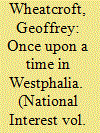

|
|
|
|
|
| Publication |
2011.
|
| Summary/Abstract |
FOR GOD'S sake do not drag me into another war," said the Reverend Sydney Smith in 1823.
I am sorry for the Spaniards-I am sorry for the Greeks-I deplore the fate of the Jews; the people of the Sandwich Islands are groaning under the most detestable tyranny; Bagdad is oppressed . . . Thibet is not comfortable. . . . The world is bursting with sin and sorrow. . . . Am I . . . to be eternally raising fleets and armies to make all men good and happy?
|
|
|
|
|
|
|
|
|
|
|
|
|
|
|
|
| 10 |
ID:
106924
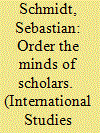

|
|
|
|
|
| Publication |
2011.
|
| Summary/Abstract |
References to the Peace of Westphalia have played an important role in the discourse of international relations. Originally referred to as a concrete historical event and associated with a variety of meanings, such as the triumph of state sovereignty, the establishment of a community of states, and even the beginnings of collective security, the Peace was later transformed into a conceptualization of the international system. Beginning in the late 1960s, phrases like "Westphalian system" came to convey a package of ideas about international politics limited to the supremacy of state sovereignty, territoriality, and nonintervention, to the exclusion of other meanings. This conceptualization serves as a popular and convenient contrast to a more globalized order, but there are problems with its use: first, because the Westphalian system is an ideal-type that might never have actually existed, the impact of globalization may be exaggerated by scholars who employ it. Second, its use implies a linear progression from some Westphalian configuration toward some "post-Westphalian" state of affairs, whereas actual system change is likely to be more complex.
|
|
|
|
|
|
|
|
|
|
|
|
|
|
|
|
| 11 |
ID:
088122
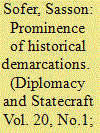

|
|
|
|
|
| Publication |
2009.
|
| Summary/Abstract |
It came as no surprise that interest in the temporal dimension of international politics was on the rise at the turn of the millennium. Of no less importance is the prospect for a "historical turn" in international relations theory. This paper attempts to clarify the relationship between historical demarcation and international understanding of epochal change, and the transformation of world order. Two momentous historical demarcations are examined: the Peace of Westphalia, and the New World Order. The paper offers two propositions. First, that the year 1648 remains the most appropriate historical moment to demarcate the beginning of the Westphalian order, and that the attempt to push the historical demarcation to either the late Renaissance, or the nineteenth century, is theoretically and historically counterproductive. Secondly, that the New World Order of 1989-1992 is only the beginning of a transitory period in history with no conclusive shape or substance, and that the term post-Westphalian order is premature.
|
|
|
|
|
|
|
|
|
|
|
|
|
|
|
|
| 12 |
ID:
091434
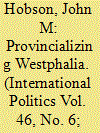

|
|
|
|
|
| Publication |
2009.
|
| Summary/Abstract |
This article critiques the 'Westphilian narrative' of the sovereign state. The dominant Eurocentric account assumes that the sovereign state emerged through a series of developments that unfolded endogenously within Europe, none of which were influenced or shaped by impulses that emanated from the East or from the non-Western world. Having outlined the various Eurocentric theories of the rise of the sovereign state, the bulk of the article forwards a non-Eurocentric alternative narrative. While accepting that there were multicausal economic, discursive, political and military foundations to sovereignty, I argue that each of these was significantly enabled by Eastern influences, in the absence of which the sovereign state might not have made an appearance within Europe. In the process, I suggest that the rise of the sovereign state occurred during the era of, and through the impact of, 'Oriental globalization', thereby recasting the relationship between sovereignty and globalization more generally
|
|
|
|
|
|
|
|
|
|
|
|
|
|
|
|
| 13 |
ID:
082219
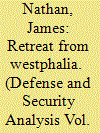

|
|
|
| 14 |
ID:
098544
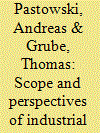

|
|
|
|
|
| Publication |
2010.
|
| Summary/Abstract |
A promising candidate that may follow conventional vehicles with internal combustion engines combines hydrogen from regenerative sources of energy, fuel cells and an electric drive train. For early fleets introduced the refuelling infrastructure needs to be in place at least to the extent of the vehicles operational reach. The question arises which strategies may help to keep initial hydrogen and infrastructure cost low? Industrial production, distribution and use of hydrogen is well-established and the volumes handled are substantial. Even though today's industrial hydrogen is not in tune with the long-term sustainable vision, hydrogen production and infrastructure already in place might serve as a nucleus for putting that vision into practice. This contribution takes stock of industrial production and use of hydrogen in North Rhine-Westphalia based on a recently finalized project. It demonstrates to which extent industrial hydrogen could be used for a growing number of vehicles and at which time additional capacity might need to be installed.
|
|
|
|
|
|
|
|
|
|
|
|
|
|
|
|
| 15 |
ID:
153879
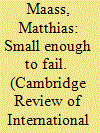

|
|
|
|
|
| Summary/Abstract |
Since the Peace of Westphalia, few great powers have “died”, while the “death rate” and proliferation of small states has been dramatic at times. What causes these fluctuations? In this paper, I claim that the dominant reason for the extinction, emergence and proliferation of the small state over the last three and a half centuries is to be found at the system level. Ultimately, small state survival is determined by the particular set-up of the state system. I advance this argument from the perspective of international relations theory, integrating the relevant scholarship of the English School and realism, especially structural realism. The latter’s systemic perspective provides the basis for arguing that small states are structurally irrelevant. It is this feature of the small state, its irrelevance with regard to the power-based structure of the state system, which has caused the small state to “struggle for existence” in the past, and which has allowed small states to proliferate during the bipolar Cold War.
|
|
|
|
|
|
|
|
|
|
|
|
|
|
|
|
|
|
|
|
|